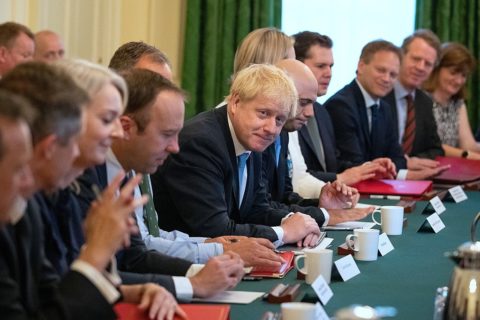In Spiked, Tom Slater recounts the brief moment last week that the great and good of British left wingers found nice things to say about freedom of speech. A very brief moment:
The British left – or what passes for it today – briefly pretended to care about free speech this week. Which was kind of cute. It was all sparked by Tory leadership no-hoper Rishi Sunak’s bonkers suggestion that people who “vilify” Britain should be put on the Prevent anti-radicalisation programme, alongside all the Islamists and fascists. “Who are the real snowflakes?”, thundered one left-wing commentator. “Fascism creeps ever closer”, warned Richard Murphy, a one-time adviser to Jeremy Corbyn, as he wondered out loud if he might soon end up in “some camp of Sunak’s choosing for ‘re-education'”.
This is probably the meme that Darren Brady posted which drew the attention of Hampshire Police’s crack “hurty words and pictures” squad last week.
Such principled expressions of horror, over an insanely authoritarian policy that almost certainly will never be implemented, might have had a bit more weight had the exact same people not studiously ignored a very real incident of state censorship – and attempted re-education – that went viral last week. I’m referring, of course, to Hampshire Police’s arrest of 51-year-old army veteran Darren Brady, all because he posted an offensive meme, which arranged four “Progress Pride” flags to resemble a swastika – a clumsy commentary on the authoritarianism of the contemporary LGBT movement.
The details chillingly echo Richard Murphy’s tweeted fever dream. Reportedly, the police had visited Brady 10 days before they tried to arrest him, informing him that he had committed an offence by posting the flag meme. They offered him a deal: pay for a £60 “community-resolution course” and they’d downgrade his offence to a “non-crime hate incident”, which would still appear on an advanced background check. Brady refused and contacted Harry Miller, leading campaigner against thoughtpolicing, who was present at the arrest and spent a night in the cells himself for trying to obstruct the cops. Going by the footage, now seen around the world, the (several) officers who attended Brady’s home had no idea what offence he was supposed to have committed, saying only that he had “caused anxiety”.
So, state censorship? Yep. Threats of re-education? Yep. The police showing up at someone’s door for no other crime than expressing an opinion? Big yep. Just because it was done in a Keystone Cops sort of fashion doesn’t make the treatment of Brady any less sinister. And yet there hasn’t been a peep of protest from the left-leaning intelligentsia. The armed wing of the state is going about harassing and arresting people purely for upsetting someone on the internet. And yet the people who pass themselves off as liberal, progressive, radical even, are clearly not the tiniest bit bothered about it.
Brady isn’t an isolated case, either. Britain is fast becoming a warning to the Western world about “caring” censorship, about trying to quite literally police “hurtful” speech. According to one investigation, nine people a day are arrested in the UK over offensive things they post on the internet. On top of that, more than 120,000 people have had so-called non-crime hate incidents recorded against their name. These alleged incidents needn’t be investigated or even be credible to be recorded. So much so that an Oxford professor once managed to get a hate incident recorded against then home secretary Amber Rudd, for a speech she gave about immigration that he later admitted he hadn’t even listened to, let alone witnessed in person.






